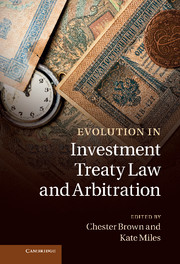Book contents
- Frontmatter
- Contents
- Contributors
- Editors' preface and acknowledgements
- Table of cases
- Table of Treaties
- Part I Introduction
- Part II Shifts in fundamental character
- Part III Actors in international investment law
- 8 Sovereign wealth funds and international investment law
- 9 Investor misconduct: Jurisdiction, admissibility or merits?
- 10 The European Union as a global investment partner: Law, policy and rhetoric in the attainment of development assistance and market liberalisation?
- 11 The ‘fair and equitable treatment’ standard and the circumstances of the host State
- 12 The plea of necessity under customary international law: A critical review in light of the Argentine cases
- 13 Making way for the public interest in international investment agreements
- 14 The participation of sub-national government units as amici curiae in international investment disputes
- Part IV The new significance of procedure
- Part V Engagement with cross-cutting issues
- Part VI Conclusions
- Index
- References
13 - Making way for the public interest in international investment agreements
from Part III - Actors in international investment law
Published online by Cambridge University Press: 05 December 2011
- Frontmatter
- Contents
- Contributors
- Editors' preface and acknowledgements
- Table of cases
- Table of Treaties
- Part I Introduction
- Part II Shifts in fundamental character
- Part III Actors in international investment law
- 8 Sovereign wealth funds and international investment law
- 9 Investor misconduct: Jurisdiction, admissibility or merits?
- 10 The European Union as a global investment partner: Law, policy and rhetoric in the attainment of development assistance and market liberalisation?
- 11 The ‘fair and equitable treatment’ standard and the circumstances of the host State
- 12 The plea of necessity under customary international law: A critical review in light of the Argentine cases
- 13 Making way for the public interest in international investment agreements
- 14 The participation of sub-national government units as amici curiae in international investment disputes
- Part IV The new significance of procedure
- Part V Engagement with cross-cutting issues
- Part VI Conclusions
- Index
- References
Summary
Introduction
One of the crucial questions posed by the expanding application of international investment agreements (IIAs) over the last two decades is the extent to which they regulate host States' ability to enact and enforce regulation intended to protect society and the environment. That question is now on the agenda of the international community and has been taken up by a prominent figure at the United Nations, the Special-Representative of the Secretary-General (SRSG) on the Issue of Human Rights, Transnational Corporations and Other Business Enterprises, Harvard political science professor John Gerald Ruggie. In his 2009 report to the Human Rights Council, the SRSG expressed concern that ‘recent experience suggests that some [investment] treaty guarantees and contract provisions may unduly constrain the host Government's ability to achieve its legitimate policy objectives, including its international human rights obligations’. Undue constraints may emerge, the SRSG explained, because ‘under threat of binding international arbitration, a foreign investor may be able to insulate its business venture from new laws and regulations, or seek compensation from the Government for the cost of compliance’. A number of non-governmental organisations (NGOs) and other analysts have expressed similar concerns and warned that IIAs and investor–State arbitration may have a chilling effect on host State regulatory initiatives that are needed to address non-investment policy objectives.
The SRSG and others cite as the basis for their concern a growing number of investor–State cases in which investors have challenged sensitive domestic legislative and administrative measures. These include cases under the North American Free Trade Agreement (NAFTA) in which investors have challenged environmental and social regulation; cases brought by investors from the US and UK in which Argentina has been held liable as a result of measures that it took in response to a serious economic crisis in 2001; and cases under a range of IIAs in which investors have challenged regulatory measures that host States have defended as designed to achieve legitimate domestic policy objectives.
- Type
- Chapter
- Information
- Evolution in Investment Treaty Law and Arbitration , pp. 271 - 297Publisher: Cambridge University PressPrint publication year: 2011
References
- 33
- Cited by

